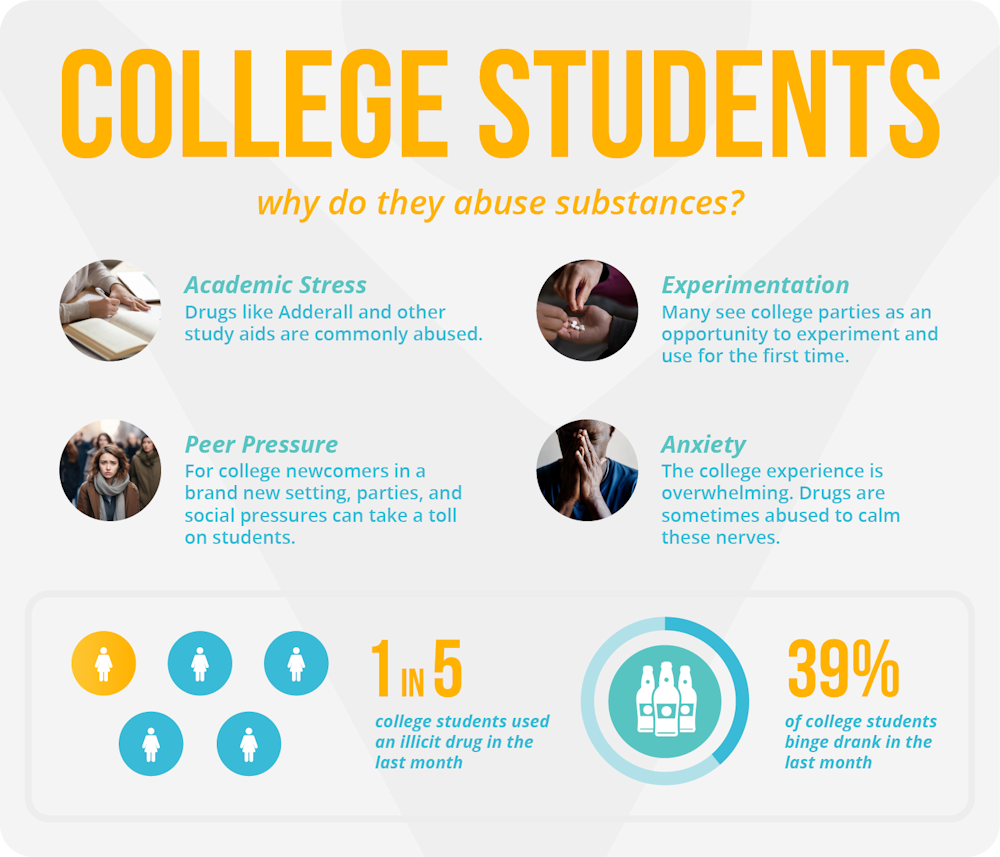Over the years substance abuse in colleges has increased dramatically. Drug abuse in college students has become a common occurrence. Alcohol and substances are popular and dangerous elements of college life.
There are a number of reasons why college students decide to use substances. Whether it be in a party setting or an academic or athletic reason, drug abuse in college students continues to be a big problem on campuses around the country.
Regardless of the reason, drug and alcohol abuse can cause major health issues down the line. Substance abuse can cause a number of negative effects – emotionally, socially, and physically.
Available 24 hours, 7 days a week
Contact Free By The Sea today to schedule a free evaluation. Our compassionate counselors are ready to address any questions you may have.
Get Help Now (844) 906-2300Reasons for Substance Abuse in College Students
There are a variety of different reasons why college students abuse substances and alcohol. Social and peer pressure tend to play a big role in alcohol and drug use in colleges. There are certain drugs that people may use for specific reasons.
A few common reasons for substance abuse in college students include:
- Academic stress – In some cases, the academic load and pressure of college can take a toll on new students. Drugs like Adderall and other study aids are commonly abused to increase concentration and boost focus.
- Peer pressure and experimentation – For college newcomers in a brand new setting, parties, and social pressures can take a toll on students. College parties typically involve alcohol and drugs – many see this as an opportunity to experiment and use for the first time.
- Anxiety – For some people, the college experience can be overwhelming. Drugs are sometimes abused to calm these nerves and handle the pressure of a new place.
Whatever the reason a student might decide to abuse drugs, the aftermath can be dangerous. It is important to understand the effects of substances and the severe health issues they can cause.
Substance Abuse in College Students Statistics
The numbers of substance and alcohol abuse in colleges have continued to rise. It is important to understand these stats and be aware of the dangers involved in drug abuse. Drug abuse in college students is more common than you might think. According to statistics from the Substance Abuse and Mental Health Services Administration (SAMHSA):
- Almost 5.4 million full-time college students drank alcohol in the past month (60%).
- Almost 3.5 million others engaged in binge drinking (39%).
- 1 in 5 students used an illicit drug in the past month (age group 18-22).
- Alcohol and marijuana are the two most frequently used drugs among college students.
- Almost 10% of full-time college students drank alcohol for the first time in the past year (age group 18-22).
In recent years, these numbers have continued to increase. Drug and alcohol abuse continues to be a problem with college students. Not only do these cause problems academically, but it also causes issues mentally and physically as well.
The Relationship Between Drug Abuse and Suicide
Suicide is the second leading cause of death in the college demographic – nearly 1,100 deaths every year. This number is heavily impacted by the use of drugs among college students. Continuous drug and alcohol abuse can lead to a number of mental health challenges and emotional problems, which can lead to suicide. Substance abuse can lead to:
- Isolation
- Lowered self-esteem
- Loss of work and school
- Isolation from friends and family
These different factors stemming from substance abuse can lead to a number of negative health effects. If you are concerned that a loved one or someone you know is abusing drugs, get help immediately.
Commonly Abused Drugs Among College Students

It is also worth noting that in some cases, college adults mix these substances with alcohol. Mixing alcohol and substances can cause dangerous effects, and increases the chance of overdose and death.
Marijuana
Marijuana (also known as weed) is one of the most used drugs on college campuses. Many students either smoke or extract cannabis into edibles. While marijuana might not be as dangerous as other drugs, it can still cause some negative side effects. Marijuana is known to increase anxiety and cause addiction after continuous use.
Study Aids (Adderall, Ritalin, etc.)
One of the more popular forms of drug abuse on college campuses is study aids. These increase a person’s ability to concentrate and stay focused longer. They are typically prescription drugs, more specifically amphetamine drugs. Using these drugs without a prescription is illegal and dangerous. Common study aids include:
- Concerta
- Adderall
- Modafinil
- Ritalin
The stimulants continue to be abused across colleges around the country. Along with their addictive nature, these study aids can cause a multitude of negative effects with continued use. In many cases, students who abuse these aids end up doing worse academically.
Cocaine
Cocaine is a very popular drug to use during college parties. This drug gives you a number of energizing effects and comes in the form of a white powdery substance. Cocaine abuse can be extremely dangerous and can lead to fatal overdoses after continued use.
Students use cocaine for the same reason as study aids. Cocaine makes a person feel more energized and productive for the time being. This substance can become incredibly dangerous if mixed with alcohol or other substances, a trend we see far too often in college parties.
Cocaine has long-lasting effects that can ruin a person’s life and sometimes be fatal. Drug abuse in college students continues to be an issue. If someone you know is abusing cocaine or other drugs get help immediately before it’s too late.
Alcohol Abuse and College Students
Alcohol is commonly abused on college campuses. A mixture of college life and social culture, alcohol is hugely used and abused. Statistics show how much of a problem excessive alcohol consumption has become over recent years:
- Nearly 9.6% of full-time college students have an alcohol use disorder (ages 18-22).
- 1 of 4 students reported a decrease in academic success because of alcohol abuse.
- Around 97,000 students reported alcohol-related date rape or sexual assault (ages 18-24).
- Nearly 696,000 students are assaulted by another student due to drinking (ages 18-24).
In addition to these shocking stats, is the short-term and long-term effects associated with binge and excessive drinking. Excessive drinking can eventually become an alcohol abuse disorder. If you know someone who is struggling with alcohol abuse as a college student, Free by the Sea may be able to help.
Treatment Options for College Student Substance Abuse
While substance and alcohol abuse continues to be a problem, there a number of treatment options available for college students. If you think a college student you know is struggling with substance abuse, you should help sooner than later.
There are plenty of different recourses on college campuses to help those struggling with substance abuse but sometimes getting help from a rehab center is necessary. At Free by the Sea, we have a number of effective treatment options catered to college students.
Detoxification (Detox)
This is usually the first step towards substance abuse recovery. Detoxification (or detox for short) involves ridding the body of substances or alcohol. Medically-assisted detox is highly recommended because of the harsh withdrawal symptoms that come with detox.
Medical detox helps prevent some of these symptoms. Detox is a necessary step towards recovery and opens the door for other treatment options. Free by the Sea’s facility can assist you as you look for an opportunity to detox. We’ll be right by your side every step of the way.
Behavioral Therapy
Behavioral therapy is a great next step after detox. Talking with one of Free by the Sea’s passionate therapists can help you understand and tackle some of the issues that developed after substance abuse. Free by the Sea helps students cope with these cravings and the stress that comes with college.
On many college campuses, there is access to mental health counselors. This is also an option to get help break free from the chains of addiction. It is never too late to get help.
Inpatient Rehab for College Students
Inpatient (residential) treatment allows for the highest level of treatment for drug abuse in college students. In more severe cases of addiction, it is best to have trained medical staff ready at a moment’s notice. Residential rehab allows for guidance the whole way through for struggling college students.
Inpatient treatment lets you understand and cope with your habits. Residential rehab offers Individualized therapy, support groups, and one-on-one counseling among others.
Intensive Outpatient Rehab for College Students
Outpatient is better for more mild cases of substance addiction. This type of rehab program offers the same resources as inpatient rehab but allows the person to continue with their everyday life. College students typically have a busy schedule and might put away getting help. However, outpatient offers weekly visits with a convenient and personalized schedule.
Get Help Today
If you are concerned that a loved one or someone you know in college is struggling with substance addiction, Free by The Sea is here to help. While substance abuse in college students statistics might be shocking, recovery is always possible and reachable. Contact us today to learn more information on substance abuse treatment for college students.

Dr. Richard Crabbe joined our team in 2019 as our psychiatrist and medical director. He attended the University of Ghana Medical School where he became a Medical Doctor in 1977. From 1978 through 1984, he was a medical officer in the Ghana Navy and provided a variety of services from general medicine to surgeries. He received his Certificate in General Psychology from the American Board of Psychology and Neurology in 2002.



